Polis Expansion and Elite Power in Hellenistic Karia
Alexander the Great and the Hellenistic World
After the death of Alexander the Great, as Greek culture and people influenced and were influenced by those of the Hellenistic kingdoms in Asia and Africa, this part of the world entered a complex period of transition. Alexander the Great and the Hellenistic World publishes academic works that examine and explore the world Alexander the Great forged. This series provides a comprehensive, multifaceted look at this period in history, and includes books that present rigorous analysis of the Age created by the great Conqueror. Projects appropriate for the series, including monographs, edited essay collections, and edited historical texts, bring new perspectives on the study of the people, culture, politics, art, or society of the Hellenistic world.
Titles in the series:
Polis Expansion and Elite Power in Hellenistic Karia , by Jeremy LaBuff
Polis Expansion and Elite Power in Hellenistic Karia
Jeremy LaBuff
LEXINGTON BOOKS
Lanham Boulder New York London
Published by Lexington Books
An imprint of The Rowman & Littlefield Publishing Group, Inc.
4501 Forbes Boulevard, Suite 200, Lanham, Maryland 20706
www.rowman.com
Unit A, Whitacre Mews, 26-34 Stannary Street, London SE11 4AB
Copyright 2016 by Lexington Books
All rights reserved . No part of this book may be reproduced in any form or by any electronic or mechanical means, including information storage and retrieval systems, without written permission from the publisher, except by a reviewer who may quote passages in a review.
British Library Cataloguing in Publication Information Available
Library of Congress Cataloging-in-Publication Data
Names: LaBuff, Jeremy, author.
Title: Polis expansion and elite power in Hellenistic Karia / by Jeremy LaBuff.
Description: Lanham : Lexington Books, [2015] | Series: Alexander the Great and the Hellenistic world | Includes bibliographical references and index.
Identifiers: LCCN 2015039083 | ISBN 9781498513999 (cloth : alk. paper) | ISBN 9781498514002 (electronic)
Subjects: LCSH: CariaHistory. | CariaCivilization. | City-statesGreeceHistory. | Hellenism.
Classification: LCC DS156.C33 L33 2015 | DDC 939/.24dc23 LC record available at http://lccn.loc.gov/2015039083
 The paper used in this publication meets the minimum requirements of American National Standard for Information SciencesPermanence of Paper for Printed Library Materials, ANSI/NISO Z39.48-1992.
The paper used in this publication meets the minimum requirements of American National Standard for Information SciencesPermanence of Paper for Printed Library Materials, ANSI/NISO Z39.48-1992.
Printed in the United States of America
For No One in particular, who helps me sing my didnt and dance my did.
Und wenn ihr nicht Heilige der Erkenntnis sein knnt, so seid mir wenigstens deren Kriegsmnner. Das sind die Gefhrten und Vorlufer solcher Heiligkeit.
And if you cannot be saints of knowledge, at least be for me its warriors. They are the companions and forerunners of such saintliness.
Friedrich Nietzsche, Also Sprach Zarathustra, Erster Teil
Contents
The Whisper That Cries for More
This book started as a poorly informed desire to go to graduate school and study Hellenistic history. Even then, with nary a Greek history course to my credit, I had an inkling that there was so much we still had to learn of this period, a prospect much less daunting than figuring out how to say something new about Herodotos or Thucydides. Luckily for me, the folks at the University of Pennsylvania were forgiving of vaguely formulated ambitions, and three years later I found myself swimming in folios of Hellenistic inscriptions. My inkling was of course confirmed, but what stood out to me more was that there seemed to be two versions of Hellenistic history, and they did not quite gel. First, there is the version I allude to at the start of the Introduction, one that plays vividly in the imagination of those looking for a good story. It is a slice of history ripe for exoticizing into the kind of tale that pretends to inspire more genuine forms of world-molding from Beleriand to Valyria. This version is outdated, and rarely appears in the writings of scholars today, unless they want to write for the general public (at least in English). Then, to the fore come glorious battles, palace intrigues, delicious decadence. We do not trust the crowd with much else, little realizing that they will soon start hoping for dragons.
The second version of Hellenistic history is based on new evidence or new ways of thinking about old evidence, and is more attentive to non-fabulous elements. Where it does not completely excise the first version, it seeks to augment it with the past of all those millions of people who were not royalty or elephants. As I researched this book, first as an advanced graduate student and then as a doctor now wise to the generosity of my dissertation committee, I wondered why we kept most of what we were actually doing from everyone else. Looking at Hellenisms more famous cousins, it was clear that non-specialists were interested the latest research on Spartan society, Athenian democracy, or Roman power-sharing and immigration policy, alongside more entertaining topics like the Persian and Peloponnesian Wars and Roman conquests and gladiators. What seemed, and seems, to be missing from Hellenistic studies is the desire or the capacity to package more practical aspects of this period for public consumption. Given the dynamism of the field, this is a shameful deprivation.
The current study is not primarily intended to address this deficiency. Many of the debates will seem foreign and pedantic to the non-scholar. The Greek will be tedious to skim in locating translations, and s/he may find it advisable to omit the detailed consideration of evidence that dominates in favor of their introductions and conclusions. Yet in the pages that follow, the attentive reader can find the story of communities committed to inclusive government but constrained by threats of violence, vast financial inequalities, and in some cases devastating climate change (e.g., Myous). This story is frustratingly full of holes, usually at the most exciting places, but it should also sound familiar. The challenges of maintaining traditions of shared government in the face of the need for decisiveness and strength are not peculiar to post-1800 nation-states, Classical Athens, or Republican Rome. It is time for this impression, which almost no scholar accepts despite its permanence in the popular imagination, to be laid to rest. Hellenistic democracies like the ones treated in this study offer parallels to today that are instructive as much for their differences as for their similarities. It is often assumed, for instance, that direct democracy is incompatible with the massive citizen bodies of modern nation-states, but even in states of a few thousand people, the difficulties enumerated above were constant problems to be solved. In short, the struggles of Karian poleis are ready to become part of a larger narrative that should dominate public perception of the Hellenistic period as much as the vanity of kings and the distorsions of misogynists.
For the patient reader, another lure wades below the surface of explicit content. I hope that one impression given by this book is that it could not have been written without discoveries made within my lifetime. These discoveries hint at the vast amount of evidence still to be found, which will help to plug those frustrating holes and could radically change what we think we know about, well, everything Hellenistic. I look forward to the day when the sites of this study are surveyed and excavated in equal measure to Miletos, Aphrodisias, and Iasos, regardless of the impact on the conclusions of this book. That the work of Louis Robert is still fundamental to any discussion of Karia is a testament to both the greatness of his scholarship and the extent to which his legacy has not been lived up to. But rather than risk the undone, we should embrace the opportunities to rival the discoveries made often by chance with a systematic study of the whole region of Asia Minor. This is only possible if those outside the self-drawn circle of specialization have a sense of the potential.
Next page
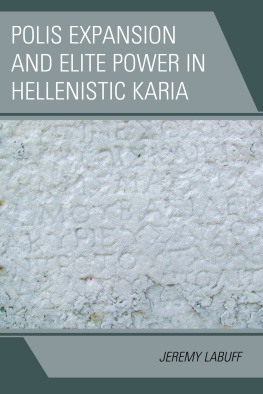

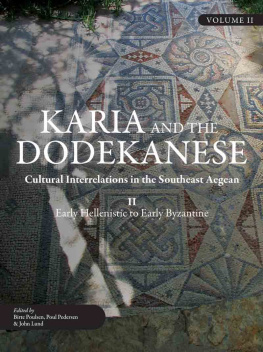
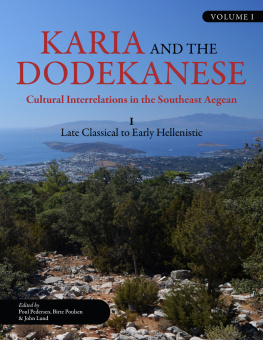
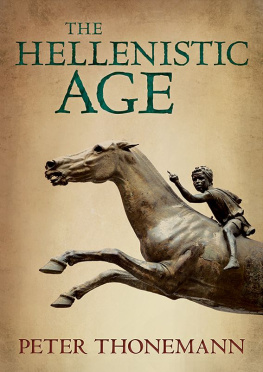
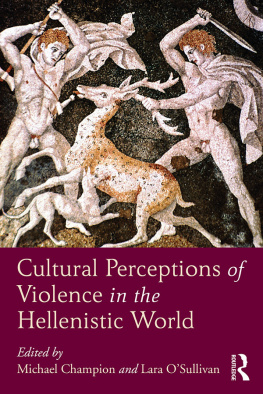



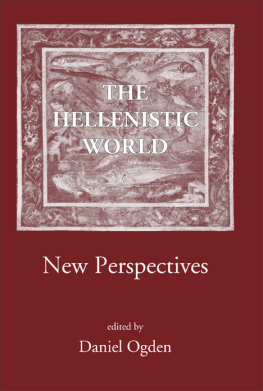
 The paper used in this publication meets the minimum requirements of American National Standard for Information SciencesPermanence of Paper for Printed Library Materials, ANSI/NISO Z39.48-1992.
The paper used in this publication meets the minimum requirements of American National Standard for Information SciencesPermanence of Paper for Printed Library Materials, ANSI/NISO Z39.48-1992.